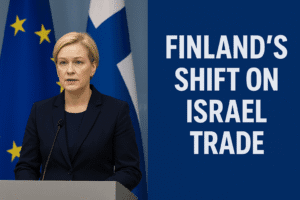Finland’s Shift on Israel Trade: A Sign of Deepening EU Frustration
Finland has signaled a notable shift in its foreign policy by opening discussions to potentially freeze the EU-Israel trade agreement. This move aligns with a growing European stance, led by Denmark and supported by Sweden and the Netherlands, aimed at increasing pressure on Israel. The Association Agreement offers significant economic benefits to Israel, making its suspension a substantial diplomatic tool. Domestically, the issue highlights sharp divisions within Finland’s coalition government, where parties disagree on Palestine recognition and humanitarian support.
While no final decision has been made, Finland’s new position reflects deepening European frustration and a search for leverage. The situation underscores the challenge of balancing economic ties with ethical foreign policy objectives. Ultimately, this development marks a significant step in the EU’s evolving approach to the conflict.

Finland’s Shift on Israel Trade: A Sign of Deepening EU Frustration
In the echoing halls of a Copenhagen conference centre, Finland’s Foreign Minister Elina Valtonen delivered a subtle but significant shift in her country’s foreign policy. Her message: Finland is now open to discussing the suspension of the EU’s lucrative trade deal with Israel, a move that signals growing impatience within the bloc over the ongoing conflict in Gaza.
This isn’t a decision made in isolation. It’s a carefully calibrated step that reflects a broader European struggle to find meaningful leverage and highlights the complex political tightrope walked by governments, including Finland’s own coalition.
From Reluctance to Reconsideration
Just weeks ago, in July, Finland’s official position was one of opposition to freezing the EU-Israel Association Agreement. The shift, as explained by Valtonen, is a move from outright refusal to a pragmatic openness. “No decisions will be made here today,” she cautioned, framing it as a necessary step to gauge the position of all 27 member states. “But we are able to gauge where the member states stand, and then when it is time for decisions, they will be made.”
This change in tone aligns Finland with a growing cohort of EU nations. Denmark, holding the rotating presidency, is actively lobbying for a freeze on the trade provisions. Prime Minister Mette Frederiksen argued forcefully that the EU must “be prepared to punish Israel economically.” Similarly, Sweden and the Netherlands have jointly called for action in a letter to the EU’s foreign policy chief.
The unspoken driver is a sense that diplomatic appeals are falling on deaf ears. The EU’s largest trading partner is using that economic comfort to pursue policies a growing number of its members find unacceptable. Suspending the agreement, even in part, is one of the few significant economic tools at the EU’s disposal.
The Stakes of the Agreement
To understand why this is a potent threat, one must understand what’s on the table. The EU-Israel Association Agreement is far more than a simple tariff reduction. It is a comprehensive framework that deeply integrates Israel’s economy with the world’s largest trading bloc.
It grants Israeli exporters privileged, often duty-free, access to a market of 450 million consumers. For industries like technology, pharmaceuticals, and agriculture, this access is a critical component of their business model. Suspending the deal wouldn’t just be a symbolic slap on the wrist; it would introduce immediate financial friction and uncertainty, sending a stark message to the Israeli government and business community about the cost of its current trajectory.
The Domestic Divide: A Government at Odds with Itself
Perhaps the most revealing human insight from Finland’s deliberation is how it exposes a deep fracture within its own government. Foreign Minister Valtonen’s National Coalition Party has voiced support for the recognition of a Palestinian state, a position in line with this newfound openness to economic pressure.
However, this stance puts them directly at odds with their coalition partners. The Finns Party and the Christian Democrats firmly oppose recognition. This tension erupted publicly just this week when Development Minister Ville Tavio of the Finns Party expressed opposition not only to statehood but even to Finnish-sponsored medical care for Palestinian children.
This internal conflict has left Finland’s broader Middle East policy in a state of political limbo. The government can agree on a measured openness to an EU-wide trade discussion, but it remains paralysed on a more fundamental national question like recognition. It’s a microcosm of the debates happening across Europe, pitting realpolitik and economic interests against human rights and a rules-based international order.
The Road Ahead
Finland’s signalling is a important piece in a larger puzzle. For any action to be taken, a consensus among EU member states is required, a notoriously difficult bar to clear. Nations with closer ties to Israel may yet block the move.
However, the fact that a traditionally consensus-driven country like Finland is willing to entertain such a serious economic measure is a telling indicator of shifting sentiments. It reflects a mounting frustration that words are not enough and that the status quo is unsustainable.
The EU is slowly, and somewhat messily, testing the weight of its economic power in one of the world’s most fraught diplomatic arenas. Finland’s journey from “no” to “open to it” shows that the pressure is building, one member state at a time. The world is watching to see if that pressure will eventually boil over into action.
You must be logged in to post a comment.